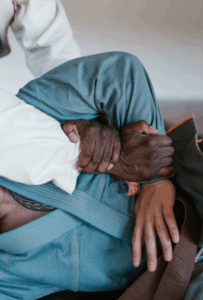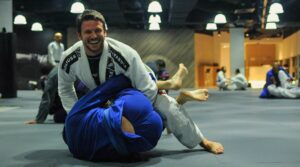Let’s get one thing straight: being strong doesn’t necessarily make you dangerous. At least, not in the way most guys think it does.
You could be benching twice your bodyweight, deadlifting 500 pounds, and look like you were carved out of a mountain – but if you don’t know how to move, control space, or apply and maintain that strength under pressure, it doesn’t mean much in a real confrontation. All it takes is one guy who knows a little jiu-jitsu to make you look foolish, fragile, and frankly… fake.
In this post, we’re diving into why learning how to fight should be part of every man’s personal development plan – not because we’re advocating for violence, but because we’re advocating for preparedness, humility, and genuine confidence. We’ll also explore what happens when your physicality meets someone who’s actually trained. Spoiler alert: it’s not pretty.
The Myth of Raw Strength
Walk into any gym, and you’ll see it. Big dudes, repping out curls, checking themselves out in the mirror, talking about their “alpha energy” while never testing themselves outside the weight rack.
This isn’t to shame strength – strength is beautiful and important. It’s a foundational element of masculinity, health, and longevity. But it’s not functional unless it’s paired with skill. Real-world altercations do not care about your one-rep max. It cares about how well you move, think, and adapt under stress.
You could be strong as hell – but if someone gets behind you, wraps their legs around your waist, and sinks in a rear naked choke, your massive biceps are suddenly pretty irrelevant. You can’t flex your way out of that.
How Easy It Is to Lose Your “Man Card”
Here’s the harsh truth: one tussle with someone who’s done even six months of Brazilian jiu-jitsu, and your illusion of dominance can disappear faster than you can imagine. And it’s not just that you lose – it’s how you lose.
 Jiu-jitsu doesn’t just teach someone how to win a fight – it teaches them how to make you feel like a child during that fight. No striking, no theatrics. Just leverage, angles, timing, and technique. All the traits that don’t show up in a mirror selfie.
Jiu-jitsu doesn’t just teach someone how to win a fight – it teaches them how to make you feel like a child during that fight. No striking, no theatrics. Just leverage, angles, timing, and technique. All the traits that don’t show up in a mirror selfie.
The guy who knows jiu-jitsu isn’t tense. He’s loose. He’s smiling. He knows how to breathe, how to stay calm when someone’s going hard, how to conserve energy while his opponent wastes theirs. He knows how to break grips, reverse positions, and isolate limbs like a surgeon. He knows how to submit someone with pressure alone, and how to apply pain without ever landing a punch.
Now, picture the “tough guy” who’s never trained. He comes in swinging with ego and force, relying on his standard “I just see red bro” tactic, but within 30 seconds, he’s on his back, gasping for air, arms pinned to the ground, neck cranked sideways while he begs to be let go. It’s embarrassing – and it’s a serious wake-up call, one that I highly encourage every man to go through on the gym mat instead of learning firsthand on the pavement.
You’re Not as Dangerous As You Think
Let’s break this down a bit more. The vast majority of guys assume they’re way more capable in a fight than they are in reality. Why? Because of ego. Because we’ve watched action movies, played sports, or maybe gotten lucky in a few middle school scraps. We assume size equals dominance and that “being a man” inherently means knowing how to defend ourselves.
But unless you’ve spent time in a dojo, on a mat, or in a ring, you don’t even really know what violence actually feels like. You don’t understand distance management, balance, or timing. You don’t know what it’s like to be under pressure with someone trying to choke or submit you… or kill you. And you definitely don’t know how fast things can go sideways when adrenaline spikes and technique fails.
That illusion of control? It’s a fragile thing. And one of the best gifts you can give yourself is the chance to shatter it voluntarily through training, instead of through a public humiliation, or worse, genuine danger.
Fighting as a Rite of Passage
There was a time when every culture had a rite of passage – a moment or series of trials where boys had to earn the respect of older men. That rite often involved some sort of physical struggle. It taught pain tolerance, discipline, and focus. It showed you what you were made of, and it deeply humbled you.
Modern life doesn’t offer that. We’ve outsourced our challenges to digital screens and safe spaces. But deep down, the soul still craves it. And that’s why martial arts – especially grappling arts like jiu-jitsu – are so transformative.
When you step onto the mat, there’s no hiding. Your social status, job title, and physique don’t matter. It’s just you, someone else, and the truth. Every roll (sparring match) is a reality check. Sometimes you win. Sometimes you get crushed. But every time, you learn.

The Psychological Edge of Knowing How to Fight
Training in martial arts doesn’t make you violent. It actually makes you less likely to be violent. Why? Because knowing what you can do makes you less desperate to prove it, and you also understand the reality of the danger in an intimate way. If you know how to hurt people, it’s a lot less likely that you want to.
A man who trains consistently develops a unique calm under pressure. He’s been there before. He knows how to stay composed. That composure bleeds into other parts of life – into relationships, business, fatherhood, and crisis.
Confidence isn’t chest-thumping bravado. It’s knowing that you can handle yourself, that you’ve been tested, and that you don’t have anything to prove. That kind of quiet confidence is magnetic. People can sense it. Women respect it. Other guys admire it, even if they act like they hate it.
And you know who else notices it? Predators. Because predators want easy prey. And a man who carries himself with competence and humility isn’t easy.
Fitness Meets Function: Using Your Strength
So, coming full circle here – you’re already strong? Great. Now, imagine what happens when you add skill to that strength. When you learn how to apply leverage, manipulate balance, and impose control, suddenly you’re not just strong; you’re formidable.
And here’s the good news: you don’t have to become a world champion or really compete at all. You don’t even need to train every day. Six months of consistent jiu-jitsu a few times a week will teach you more about real fighting than years of lifting ever could. You’ll learn how to survive bad positions, escape holds, defend against takedowns, and handle pressure. That foundation alone puts you ahead of 95% of the population.
Plus, it makes training more meaningful. You stop lifting just for aesthetics and start training for utility and function. Your body becomes a weapon, not just a decoration.
Where to Start
If this post hit a nerve, good. That’s the point.
Here’s how to start reclaiming your edge:
- Find a reputable martial arts gym — Look for places that offer Brazilian jiu-jitsu, wrestling, or Muay Thai. Watch a class. Talk to the instructors. See if the vibe fits you.
- Start slow, stay consistent — You don’t need to spar right away. Just show up, learn, and focus on the basics. The belt system in jiu-jitsu is a long game for a reason. Humility is built into the process.

- Leave your ego at the door — You will get tapped. You will feel weak. That’s the medicine. That’s how you grow.
- Cross-train your fitness — Keep lifting. Keep running. But add in movement drills, mobility work, and functional strength patterns. Be an athlete, not just someone who’s really good at picking up heavy stuff in controlled positions.
- Let your training inform your life — Notice how your patience improves. How your breath control sharpens. How your confidence grows quietly, from within.
Final Thoughts: Real Men Train
If you care about your health, your family, and your role in the world, you owe it to yourself to become competent. Not just look the part. But be a part.
Because if you don’t know how to fight, you’re gambling everything – like, your life – on the hope that you’ll never need to. And as the old saying goes, “It’s better to be a warrior in a garden than a gardener in a war.”
So train. Get humbled. Grow. And stop thinking your muscles make you invincible – because until you’ve been on the mats, you don’t know the truth.









